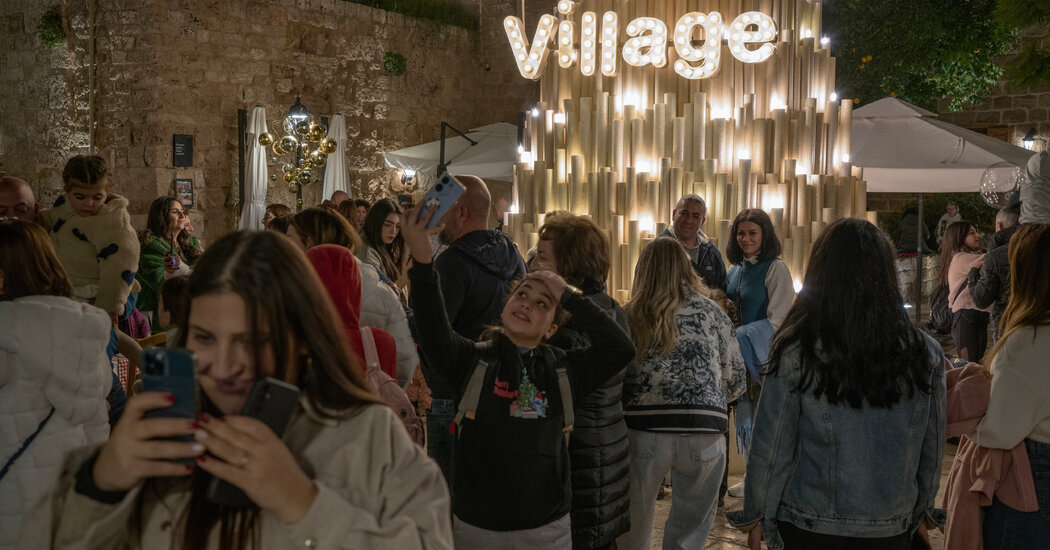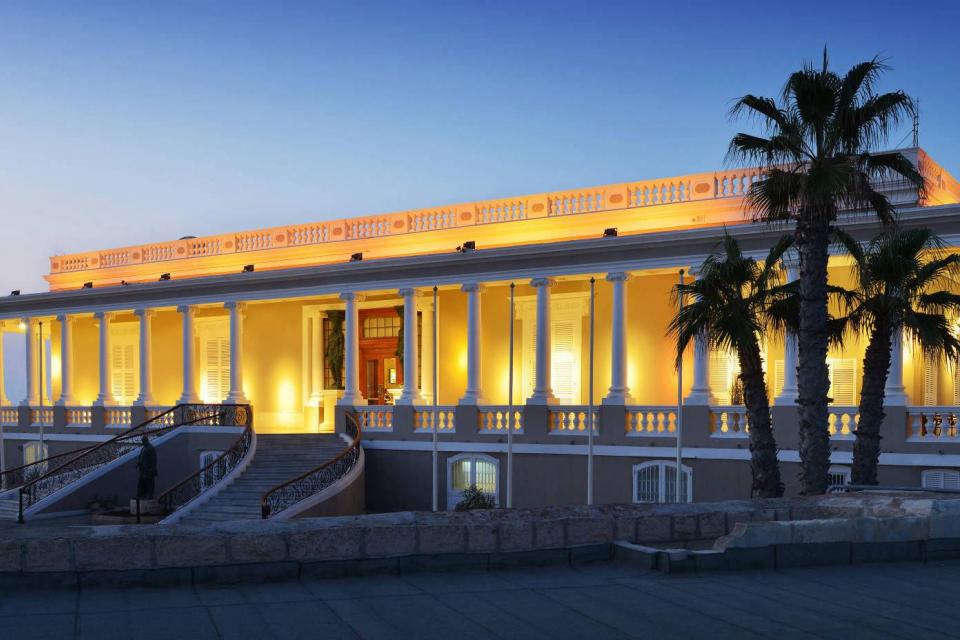As the war between Israel and the Lebanese militant group Hezbollah intensified last September, Abed Al Kadiri sat glued to the television in the art studio where he was working in Kuwait.
Mr. Al Kadiri watched as Beirut, the Lebanese capital and city of his childhood, was ravaged by Israeli bombardments. He was distraught about what members of his family, including his mother and 13-year-old son, along with his friends, were enduring there. He began having nightmares and panic attacks and was unable to sleep.
Determined to support his family and help his country rebuild, Mr. Al Kadiri decided to book a ticket home.
“Lebanon was going into an apocalyptic phase,” Mr. Al Kadiri, 40, said on a recent morning in the outskirts of Beirut. “Going back was the only best option.”
Lebanon’s large and influential diaspora — estimated at nearly three times the size of the country’s population of 5.7 million — has been trickling back, hoping to offer physical and financial support for a country devastated by one of the bloodiest wars in decades in the Mediterranean nation.
The challenges are huge. The returnees are coming back to a shattered country whose economy has been in crisis for years and which has long been plagued by sectarian tensions, political bickering and foreign interference. Lebanon’s trajectory remains deeply uncertain after a conflict that is likely to shift the balance of power inside the country and across the Middle East.
But many of the returnees say they felt that they had no choice, even as a cease-fire agreement between Israel and Hezbollah signed in November remains delicate.
“I felt like our country was calling us, that our physical presence was important,” said Zeina Kays, 48, a communications consultant who left Lebanon in 2004 for Doha, Qatar, where she has lived and worked on and off since then. She returned to Lebanon in October.
In Doha, she said, she watched on television as families displaced from Beirut arrived in other cities and towns across Lebanon with what remained of their belongings. As the deaths and the destruction escalated, she had “an emotional urge” to return and help, she said.
Ms. Kays, 48, is now back for good, she says, in the Koura area, about 30 miles north of Beirut, where she and her husband own a home. There, with the help of friends and family, she spearheaded a campaign to secure supplies — blankets, medicine, food, utensils and clothes — for dozens of displaced families in her hometown and nearby villages.
“This war demonstrated the patriotism, solidarity and unity that exists among all Lebanese people, regardless of their region or religion,” she said in an interview in Batroun, a coastal city that is also home to the Lebanese Diaspora Village, a cultural and touristic project aimed at connecting overseas Lebanese to their homeland.
“Lebanon deserves a brighter vision and a better future,” Ms. Kays said.
War came again to Lebanon after the Oct. 7, 2023, Hamas-led attack on Israel. Hezbollah began targeting Israel in solidarity with Hamas, setting off a series of tit-for-tat attacks across the Israeli-Lebanese border. The conflict, which escalated in late September, killed and injured thousands of people and displaced an estimated 1.3 million, according to Lebanese officials and the United Nations.
Entire villages and neighborhoods, especially in the south, were pummeled as Israel conducted intense air raids. Hezbollah, a dominant political and military force that is backed by Iran, was severely weakened as its top leaders were assassinated and its ally in neighboring Syria, Bashar al-Assad, was ousted.
The war exacerbated the mounting problems already facing Lebanon.
The economic disarray, beginning in 2019 and aggravated by pandemic lockdowns, was ranked by the World Bank in 2021 as among the worst national financial crises since the mid-19th century. Anger over corruption led to huge antigovernment protests. Then, an explosion at the Beirut port in 2020 destroyed parts of the capital and killed hundreds. For two years, Lebanon had a caretaker government, and a new president and prime minister were chosen only in January.
“These last few years in Lebanon were really like a roller coaster,” said Mr. Al Kadiri, the artist, who left Beirut for a second time after the 2020 port explosion.
He first departed Lebanon for Kuwait during the 2006 war between Israel and Hezbollah. But he returned in 2014, establishing a studio and reconnecting with the city. He decided to leave again when the port blast destroyed a gallery where he had been exhibiting his work. After starting an initiative titled “Today, I Would Like to be a Tree” in Beirut to help rebuild homes shattered by the explosion, he went to Paris, hoping to find work in the arts there to support his family.
He had just arrived in Kuwait from Paris to curate a show when the latest war escalated.
Now he is back in Beirut again. “The future can be dark, concerning and scary, but we are here,” he said. “Even if we leave, we still come back.”
Lebanese started leaving their homeland in waves starting in the late 19th century, when it was under the Ottoman Empire, and continued to emigrate during French rule and after independence in the 1940s. They fled sectarian divisions, economic crises, famine during World War I, politically motivated killings and a civil war from 1975 to 1990.
In countries like Australia, Brazil, Nigeria and the United States, they and their descendants have established new lives. Among their numbers are the international lawyer Amal Clooney and the trader-turned-philosopher Nassim Nicholas Taleb.
Many also kept a close relationship with home: In 2023, the diaspora sent some $6 billion in remittances, or about 27.5 percent of Lebanon’s gross domestic product, according to the World Bank.
As the war unfolded last year, the Lebanese diaspora mobilized to raise money and emergency aid.
Many say they are watching how the new government plans to rebuild the economy, enforce the delicate truce between Israel and Hezbollah, and stabilize the nation before they decide whether to return.
Another consideration, said Konrad Kanaan, a 31-year-old lawyer based in France who was visiting Beirut recently, is the shifting geopolitics of the region and how they could affect Lebanon’s future.
At a recent dinner at Mr. Kanaan’s brother’s home in the Achrafieh neighborhood in Beirut, an animated conversation ensued about Syria and Gaza. One family member twice quoted the Israeli prime minister, Benjamin Netanyahu, and said she was eager to understand what his vision for a “new Middle East” would look like. Another spoke about the agony and emotional resentment brewed by recurring wars.
They all acknowledged that none of them had a clear idea of the future.
“I don’t think resilience is something very positive,” Mr. Kanaan said of an attribute cited by many Lebanese. “It is draining.”
Many Lebanese also wonder what will happen to Hezbollah, how the group’s relationship with Iran will develop and whether the militants will withdraw from southern Lebanon as agreed in the truce with Israel. While anger with Israel is high among Lebanese, many have openly criticized Hezbollah for attacking Israel at Iran’s behest.
“We love our homeland, but it was taken from us by the Iranians,” said Rabie Kanaan, a 35-year-old business developer from Australia who was visiting family in Beirut (and is no relation of Mr. Kanaan the lawyer). Rabie Kanaan is originally from Tibnin, a town in southern Lebanon that was pounded by Israeli airstrikes during the war. His family’s home was in ruins, he said, and he is now unable to bring his 8-year-old daughter to visit the verdant hills where he grew up.
“She’s always asking, ‘Dad, why are they always fighting in our country?’” he said. He tried to counter that notion, he added, telling her, “As ordinary people, we just aim for peace.”
Sarah Chaayto contributed reporting from Beirut.


